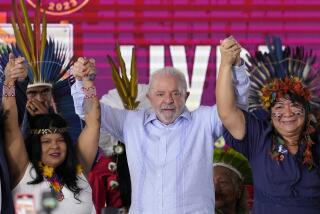America Is Losing Its Luster as the Shining City on a Hill : Democracy: The rest of the world is becoming ‘more like us’ as we used to be, outpacing us in citizen interest, political dynamism and competitive capitalism.
From Argentina to Hungary, democracy and capitalism are on the march.
The productive energies unleashed by participatory politics and economic competition have been plainly evident for some time in Western Europe, Japan and in many East Asian countries. The Soviet Union and the nations of Eastern Europe are now dramatically reforming their economies and cautiously opening up their politics.
Even in Latin America, where centralized and hierarchical authority is deeply rooted, a strong thrust toward competition is taking place. Although elected as a Peronist strongman with entrenched labor-union support, Argentina’s Carlos Saul Menem is privatizing key enterprises, reducing the role of the state and deregulating the economy. Venezuela’s Carlos Andres Perez and Jamaica’s Michael Manley, once firm believers in expanding the state apparatus and nationalizing foreign enterprises, now sing the praises of foreign investment and streamlined government. Peru’s Mario Vargas Llosa, the prize-winning novelist, is likely to be elected on a platform that amounts to little more than trusting popular sovereignty and the discipline of the free market. Brazil’s most likely next president, Fernando Collor de Mello, sings the same tune.
Perhaps the most thoroughgoing efforts to expand popular participation in politics and stimulate economic competition are occurring in Mexico. After three generations of authoritarian rule, Mexicans are clamoring for the “effective suffrage” that was their revolutionary battle cry in 1910. And after at least 30 years of steadily expanding government control of the economy, Mexico is now pushing privatization, including the sale of public utilities. The government’s decision to sell the Mexican national telephone company to private, and most likely foreign, investors would have been unthinkable as recently as a decade ago.
Ironically, the one major country in which participatory politics and economic competition are not gaining ground is the United States. Unlike in the Soviet Union, the dominant and long-prevailing ideology in this country supports democracy and capitalism. Unlike in Latin America, underlying values and cultural trends in the United States are broadly conducive to lively political and economic competition. But in America, the disturbing trend has been toward shrinking political participation and diminishing economic competition.
Voter-participation statistics are shameful, and getting worse. One reason is the widespread perception among voters that there is little meaningful rivalry remaining in our two-party system. The programs offered and the values embraced by the candidates seem nearly alike; only their packaging and handling differ. The advantages of incumbency are enormous, further reducing the meaning of elections. No wonder political corruption is rife.
Similar complaints about the American economy can be heard. Far more resources and energy are invested in marketing than in research. More intelligence is devoted to financial speculation than to entrepreneurial creativity. Mergers and buyouts have replaced innovation and improved services as the path to higher profits. Companies and unions facing stiff competition clamor for tariff protection, not for open markets.
To succeed in the 1990s, Americans need to become “more like us,” as James Fallows has put it in contrasting the economic fortunes of the United States and Japan. We need to revive and reaffirm those qualities that made the United States great: vigorous political debate, a strong commitment to quality public education, a deep and abiding concern for social equity and incentives for entrepreneurship.
Unquestionably, political and economic competition are powerful forces. If we do not harness their energies at home, we may find ourselves severely tested in the post-Malta world.
More to Read
Sign up for Essential California
The most important California stories and recommendations in your inbox every morning.
You may occasionally receive promotional content from the Los Angeles Times.










